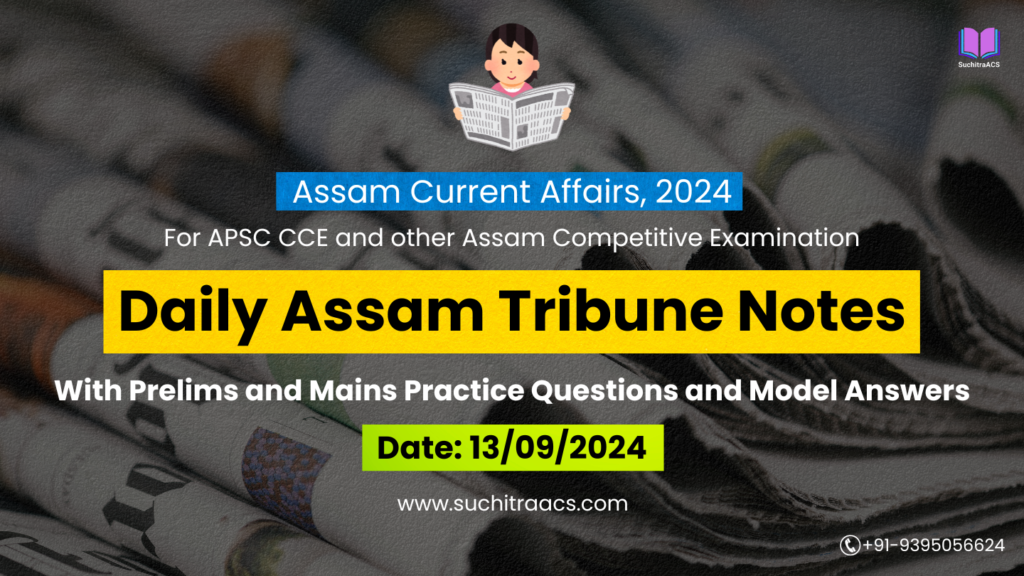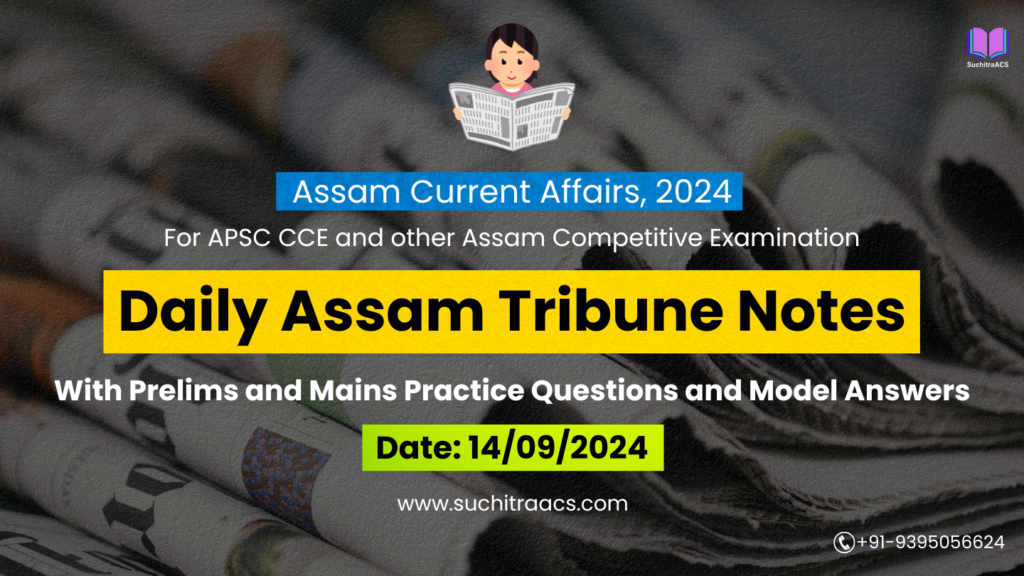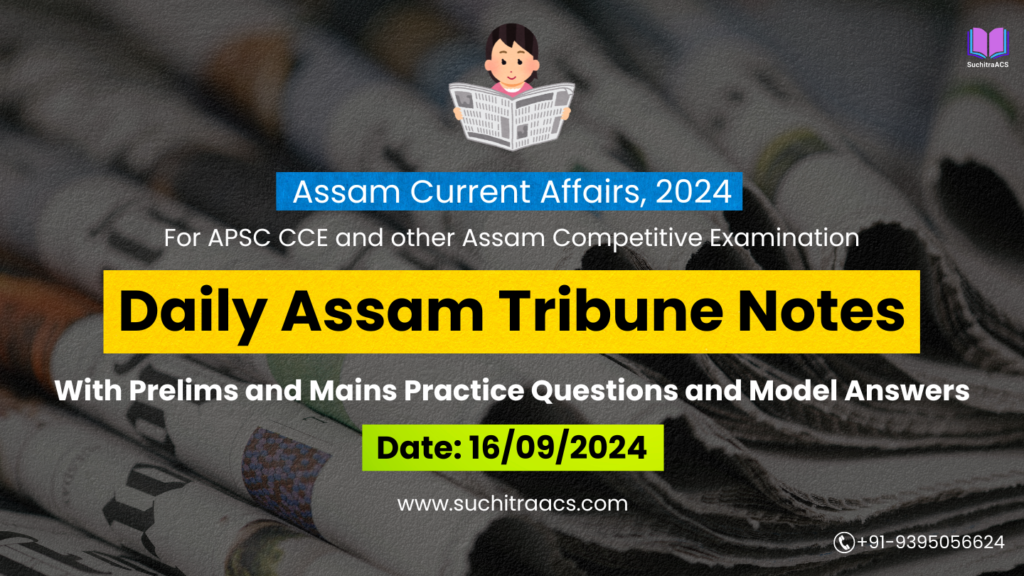1. Mukhyamantrir Atmanirbhar Assam Abhiyan
GS Paper II – Governance, Social Justice
Introduction:
The Mukhyamantrir Atmanirbhar Assam Abhiyan is a significant government initiative to promote entrepreneurship and self-reliance among Assam’s youth. This initiative is crucial for reducing unemployment and stimulating economic growth in the state.
Key Points:
- Objective: To encourage self-employment by offering financial support to entrepreneurs across various sectors.
- Financial Aid:
- For general qualifications: ₹2 lakh, with ₹1 lakh as a grant and ₹1 lakh as a loan.
- For professional qualifications (such as engineering, medicine): ₹5 lakh, with ₹2.5 lakh as a grant and ₹2.5 lakh as a loan.
- First Tranche: ₹75,000 was distributed to 25,238 entrepreneurs in sectors like agriculture, poultry, fabrication, aquaculture, livestock, and garment manufacturing.
Prelims Focus:
- Mukhyamantrir Atmanirbhar Assam Abhiyan: State initiative for youth entrepreneurship.
- Financial Support: Specific amounts granted and loaned for both general and professional entrepreneurs.
Mains Focus:
- Entrepreneurship and Employment:
- Reducing unemployment by enabling self-reliance through entrepreneurship.
- Addressing sectoral growth in agriculture, aquaculture, and manufacturing.
- Challenges:
- Monitoring utilization of funds to ensure sustainability of the businesses.
- Providing training and mentorship to entrepreneurs for long-term success.
Conclusion:
This initiative marks a crucial step towards self-reliance and employment generation in Assam. While the program has received positive feedback, proper monitoring and support will ensure that entrepreneurship thrives across the state.
2. Sub-District (Xama Zilla) Administration in Assam
GS Paper II – Governance
Introduction:
The Assam government is establishing 39 new sub-districts (Xama Zillas) starting from October 4, 2024. This move is intended to decentralize administrative functions and enhance governance at the grassroots level.
Key Points:
- Objective: To improve service delivery and administrative efficiency by bringing government functions closer to citizens.
- Structure:
- Sub-districts will be headed by an Additional District Commissioner.
- Officers from seven key departments, including Personnel, Revenue, Disaster Management, and Transformation & Development, will be deployed.
- Responsibilities:
- Issuing important certificates such as Permanent Resident Certificates and Caste Certificates.
- Delegation of Executive Magistrate powers as per CrPC, 1973.
Prelims Focus:
- Sub-districts (Xama Zillas): Decentralized administrative units in Assam.
- Key Departments: Personnel, Revenue, Disaster Management, and others involved at the sub-district level.
Mains Focus:
- Decentralization and Efficiency:
- Bringing administration closer to the people for better service delivery.
- Reducing delays in accessing public services like certificates and licenses.
- Challenges:
- Ensuring adequate staffing and infrastructure for effective functioning.
- Coordination between multiple departments for smooth governance.
Conclusion:
The establishment of sub-districts is a progressive move towards administrative decentralization. Proper implementation and coordination across departments will be key to the success of these new governance units.
3. Illegal Consignment Seized by GST Officers
GS Paper III – Internal Security, Economy
Introduction:
On September 14, 2024, Assam’s GST officers intercepted an illegal consignment of pan masala and zarda at Mirza railway station. The goods were transported without proper documentation, leading to significant penalties.
Key Points:
- Goods Seized: Cartons of pan masala and zarda brands like Sikhar 1000, SS-One Zarda, and others.
- Penalty: A penalty of ₹18.9 crore was issued to the transporters.
- GST Compliance: The consignment lacked E-way bills and other necessary documentation.
Prelims Focus:
- GST Compliance: Understanding the importance of E-way bills for transporting goods.
- Illegal Goods: Seizure of tobacco-related products being transported without proper documents.
Mains Focus:
- Internal Security and Economy:
- The incident highlights the importance of monitoring and compliance under the GST regime.
- Preventing illegal transportation of goods ensures revenue generation and public health by cracking down on harmful products like tobacco.
- Challenges:
- Ensuring that transporters comply with all regulatory requirements under the GST law.
- Preventing the smuggling of goods and avoiding tax evasion.
Conclusion:
This incident underlines the importance of robust monitoring and compliance enforcement within the GST system. Strong penalties and vigilance by authorities are necessary to ensure that businesses adhere to legal norms, thereby securing both public health and revenue.
4. Decentralized Renewable Energy (DRE) Technologies for Fisheries in Assam
GS Paper III – Environment, Technology, Agriculture
Introduction:
In light of climate change, Assam is focusing on Decentralized Renewable Energy (DRE) Technologies to strengthen the fishery value chain and promote sustainable livelihoods in the state. This initiative, led by NABARD and GIZ, seeks to support fish farmers facing climate-related challenges.
Key Points:
- DRE Technologies: These technologies, including solar water pumps, help address climate-triggered challenges like high temperatures and water scarcity.
- Pilot Project: A pilot project for DRE-driven applications in fisheries has been implemented in Assam with the support of Kalong-Kapili, a local NGO.
Prelims Focus:
- DRE Technologies: Renewable energy technologies being applied to the fishery sector.
- Climate Challenges: Issues such as high temperatures and water scarcity impacting fish farmers.
Mains Focus:
- Climate Change and Agriculture:
- Fish farmers in Assam face water shortages and other climate challenges.
- DRE Technologies like solar water pumps provide a sustainable solution, reducing dependence on fossil fuels.
- Technology and Rural Livelihoods:
- Adoption of DRE technologies can improve productivity and reduce input costs, boosting farmers’ incomes.
- Challenges:
- Scaling up these technologies across the state and ensuring affordability for small and marginal farmers.
Conclusion:
The integration of DRE technologies into Assam’s fishery sector presents a sustainable way forward in addressing climate change impacts. By promoting these technologies, Assam can enhance the resilience of its rural economy while supporting the livelihoods of its fish farmers.
5. Tree Plantation Drive by NCC under ‘Ek Ped Maa Ke Naam’ Campaign
GS Paper IV – Ethics, Integrity, and Aptitude
Introduction:
The 60 Assam Girls’ Battalion NCC launched a tree plantation drive under the ‘Ek Ped Maa Ke Naam’ campaign, aligning with the Government of India’s initiative on World Environment Day. This drive reflects the values of environmental stewardship and ethical responsibility towards nature.
Key Points:
- Campaign Details:
- Around 800 trees were planted across 29 schools and colleges by 800 NCC cadets in Guwahati.
- Trees like neem, guava, mango, jamun, amla, jasmine, and others were chosen for their environmental benefits.
- Moral and Ethical Values:
- The drive promotes environmental ethics, teaching students the value of collective action in combating climate change.
- It instills a sense of responsibility and integrity in cadets towards preserving natural resources.
Prelims Focus:
- Ek Ped Maa Ke Naam: National campaign focused on environmental conservation.
- Tree Plantation Drive: Initiatives undertaken by NCC to enhance greenery and urban ecological balance.
Mains Focus:
- Ethical Responsibility in Environmental Protection:
- Moral values such as responsibility towards future generations, environmental integrity, and promoting sustainable living.
- Fostering community involvement in ecological initiatives to promote social values and ethical leadership.
- Environmental Ethics and Collective Action:
- Importance of instilling environmental consciousness in the youth.
- Encouraging public participation in environmental movements and conservation efforts.
Conclusion:
The NCC tree plantation drive exemplifies the integration of ethics with practical environmental conservation efforts. By participating in such initiatives, the youth not only contribute to climate resilience but also internalize values of integrity and responsibility towards the environment.
6. ‘World Heart Day’ Health Camps and Ethical Responsibility in Healthcare
GS Paper IV – Ethics, Integrity, and Aptitude
Introduction:
On World Heart Day, various organizations, including Rotary Club of Gauhati West and Nemcare Hospitals, organized free heart check-up camps and awareness programs. These efforts promote ethical healthcare practices by ensuring that all sections of society receive free and accessible health services.
Key Points:
- Healthcare Services:
- Over 62 patients received free health check-ups including ECG, blood pressure, and sugar tests.
- The event emphasized the importance of preventive healthcare and early detection of heart diseases.
- Ethical Responsibility:
- Providing free healthcare services to marginalized groups reflects the ethical obligation to ensure health equity.
- The camp promotes the ethical principle of beneficence, focusing on patient welfare without the expectation of financial return.
Prelims Focus:
- World Heart Day: A global awareness day promoting cardiovascular health.
- Health Camps: Role of organizations in providing free medical services and awareness.
Mains Focus:
- Ethics in Healthcare:
- Health Equity: Ensuring access to quality healthcare for all, especially vulnerable populations.
- Social Justice: The need for healthcare systems to prioritize ethical responsibility over profit, ensuring dignity and care for all patients.
- Preventive Healthcare and Ethical Leadership:
- Importance of preventive measures to reduce the burden on healthcare systems.
- Fostering an ethical mindset within healthcare providers that prioritizes public health and community welfare.
Conclusion: The World Heart Day health camps showcase a commitment to ethical healthcare by providing free access to preventive services. This initiative reflects the broader ethical principle of ensuring health equity for all, regardless of socio-economic status.
APSC Prelims Practice Questions
1. Which of the following statements is/are correct regarding the Mukhyamantrir Atmanirbhar Assam Abhiyan?
- The scheme provides financial assistance only to entrepreneurs with professional qualifications such as engineering or medicine.
- The financial aid under the scheme is a mix of grants and loans.
- The sectors covered under this scheme include agriculture, fabrication, and garment manufacturing.
Select the correct answer using the code below:
(a) 1 and 2 only
(b) 2 and 3 only
(c) 1 and 3 only
(d) 1, 2, and 3
Answer: (b) 2 and 3 only
Explanation:
- Statement 1 is incorrect: The scheme provides financial assistance to both general entrepreneurs (with general qualifications) and those with professional qualifications. General entrepreneurs receive ₹2 lakh, while professionals get ₹5 lakh.
- Statement 2 is correct: The financial aid is a mix of grants and loans.
- Statement 3 is correct: The scheme covers sectors such as agriculture, aquaculture, livestock farming, fabrication, and garment manufacturing.
2. What is the primary objective of establishing 39 new sub-districts (Xama Zillas) in Assam?
(a) To promote private sector investment in rural areas
(b) To decentralize governance and improve administrative efficiency
(c) To introduce a new taxation system
(d) To provide special economic zones in backward areas
Answer: (b) To decentralize governance and improve administrative efficiency
Explanation:
The primary objective of establishing 39 sub-districts (Xama Zillas) in Assam is to decentralize administrative functions and bring governance closer to the people. This aims to improve service delivery and efficiency at the grassroots level.
3. Which of the following statements is/are correct about the tree plantation drive under the ‘Ek Ped Maa Ke Naam’ campaign?
- The campaign is aimed at promoting environmental ethics among NCC cadets.
- The tree plantation drive was conducted across 15 schools in Guwahati.
- Neem, guava, and jamun trees were some of the species planted during the drive.
Select the correct answer using the code below:
(a) 1 and 2 only
(b) 2 and 3 only
(c) 1 and 3 only
(d) 1, 2, and 3
Answer: (c) 1 and 3 only
Explanation:
- Statement 1 is correct: The ‘Ek Ped Maa Ke Naam’ campaign promotes environmental ethics by encouraging young NCC cadets to participate in tree plantation.
- Statement 2 is incorrect: The plantation drive was conducted across 29 schools and colleges in Guwahati, not 15.
- Statement 3 is correct: Trees such as neem, guava, jamun, mango, and others were planted during the drive.
4. What ethical principle is reflected in the free heart check-up camps organized on World Heart Day in Assam?
(a) Non-maleficence
(b) Beneficence
(c) Autonomy
(d) Justice
Answer: (b) Beneficence
Explanation:
The ethical principle of beneficence refers to actions that promote the well-being of others. By organizing free heart check-up camps and offering preventive services on World Heart Day, the organizers prioritized public welfare, thereby reflecting the principle of beneficence.
5. Which of the following statements is correct regarding the illegal consignment seized by GST officers in Assam?
(a) The consignment was seized at Guwahati airport without valid documentation.
(b) The consignment contained tobacco products like pan masala and zarda.
(c) The penalty imposed on the consignment was ₹2 crore.
(d) The transporters had all the necessary GST documents, but there was a violation of licensing rules.
Answer: (b) The consignment contained tobacco products like pan masala and zarda.
Explanation: The GST officers in Assam seized a consignment containing tobacco products such as pan masala and zarda. The goods were being transported without proper documentation, and the penalty imposed was ₹18.9 crore, not ₹2 crore.
APSC Mains Practice Question
Question: “Discuss the role of Mukhyamantrir Atmanirbhar Assam Abhiyan in promoting entrepreneurship and self-reliance among the youth of Assam. What are the potential challenges in the implementation of this scheme, and how can they be addressed?”
(Answer in 250 words)
Model Answer:
Introduction:
The Mukhyamantrir Atmanirbhar Assam Abhiyan is a flagship scheme of the Assam government aimed at promoting entrepreneurship and self-reliance among the youth. By offering financial support, the scheme seeks to empower entrepreneurs across various sectors such as agriculture, aquaculture, poultry, livestock, and garment manufacturing, thereby contributing to the state’s economic growth.
Role in Promoting Entrepreneurship:
- Financial Support: The scheme provides financial aid in the form of grants and loans, differentiated by qualifications:
- General entrepreneurs receive ₹2 lakh (₹1 lakh as a grant, ₹1 lakh as a loan).
- Entrepreneurs with professional qualifications (engineering/medicine) receive ₹5 lakh (₹2.5 lakh as a grant, ₹2.5 lakh as a loan).
- Employment Generation: By enabling young people to start their own businesses, the scheme helps address the issue of unemployment and fosters economic self-reliance.
- Sectoral Development: The scheme targets diverse sectors, encouraging innovation and skill development in industries like agriculture, fabrication, and garment manufacturing, which are key to Assam’s economic fabric.
Challenges in Implementation:
- Monitoring and Utilization of Funds: Ensuring that funds are used effectively and businesses are sustained remains a major challenge.
- Training and Mentorship: Lack of proper entrepreneurial training and mentorship can hinder the long-term success of new businesses.
- Infrastructure and Market Access: Many rural entrepreneurs may struggle with inadequate infrastructure and lack of access to markets.
Suggestions to Overcome Challenges:
- Capacity Building Programs: The government should provide entrepreneurship training, along with regular mentorship programs, to ensure that entrepreneurs are equipped with the skills needed for running a business.
- Monitoring Mechanism: Establish a robust monitoring system to track the utilization of funds and the performance of businesses under the scheme.
- Access to Markets: Develop infrastructure and marketing channels to ensure that entrepreneurs can access both local and national markets, thereby sustaining their businesses.
Conclusion: The Mukhyamantrir Atmanirbhar Assam Abhiyan is a commendable initiative to foster self-reliance and entrepreneurship among Assam’s youth. However, addressing challenges like proper fund utilization, training, and market access will be critical in ensuring the long-term success and sustainability of the program.
💡 APSC CCE Mains Answer Checking Service!

🔔 Join Our WhatsApp Study Group!
For exclusive access to premium quality content, including study materials, current affairs, MCQs, and model answers for APSC CCE and other Assam competitive exams.
Click here to join: SuchitraACS Study WhatsApp Group
📚 Want to know more about SuchitraACS’s most affordable courses?
Click here to know more: SuchitraACS Courses for APSC CCE and Assam Competitive Examinations




